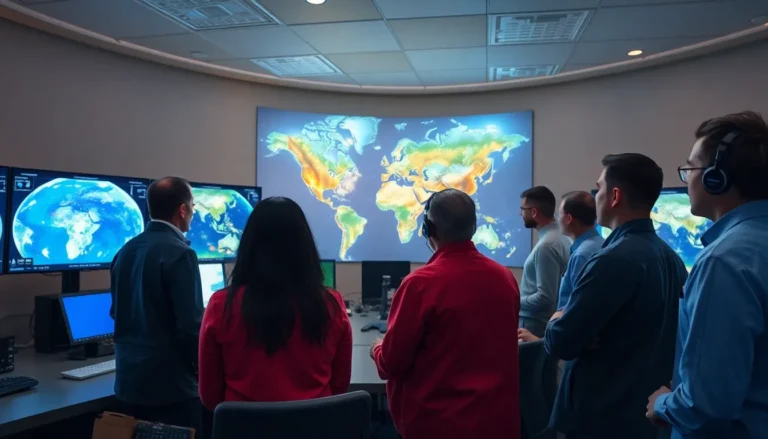Table of Contents
ToggleIn a world where toddlers can navigate tablets better than most adults, early childhood education has become more important than ever. It’s not just about learning the ABCs anymore; it’s a vibrant blend of play, exploration, and creativity that sets the foundation for lifelong success. Imagine a classroom where finger paints are as crucial as math blocks and where curiosity reigns supreme.
Today’s early education isn’t just child’s play—it’s a carefully crafted strategy to prepare kids for the future. With an emphasis on social skills, emotional intelligence, and critical thinking, educators are shaping the leaders of tomorrow. So, buckle up as we dive into the colorful and dynamic world of early childhood education, where every giggle and messy art project is a stepping stone toward greatness.
Overview Of Early Childhood Education Today
Early childhood education focuses on children from birth to eight years old, crucial for their developmental foundation. Learning frameworks integrate comprehensive approaches that blend academic and social skills. Skills such as collaboration, empathy, and problem-solving are critical components of these programs.
Evidence shows that quality early education not only enhances cognitive development but also promotes emotional and social growth. Investment in early childhood programs yields high returns, with research indicating a 7 to 10 percent return on investment for every dollar spent. These programs emphasize hands-on experiences where children engage with their environment and peers.
Technology integration has transformed early learning environments, with many educators utilizing interactive tools to enhance engagement. Multimedia resources foster creativity and exploration while teaching important concepts. Training for educators focuses on incorporating technology effectively, maintaining a balance between digital interaction and traditional learning.
Curricula now incorporate diverse perspectives, reflecting varying cultural backgrounds and experiences. Educators emphasize inclusivity, adapting teaching methods to cater to different learning styles. This adaptability ensures that every child can thrive in a supportive atmosphere.
Evidence-based practices guide instructional strategies, prioritizing play as a primary vehicle for learning. Activities involving arts, music, and storytelling enrich the educational experience, making learning enjoyable. By fostering a nurturing environment, early education lays the groundwork for lifelong learning and success.
Through a focus on developmental milestones, early childhood education prepares children for future academic endeavors. Investing in this pivotal stage creates a stronger foundation for society as a whole. Data showcases that children who participate in quality early education are more likely to excel academically and socially later in life.
Importance Of Early Childhood Education
Early childhood education plays a crucial role in shaping a child’s future. It sets the foundation for lifelong learning and development across various dimensions.
Social Development
Social development benefits significantly from early childhood education. Young children learn to interact with peers, fostering cooperation and communication skills. Educators encourage teamwork in classroom settings, allowing children to build friendships. These interactions teach empathy and conflict resolution, essential skills for their social lives. Research indicates that children who engage in quality early education exhibit stronger social abilities compared to those who do not. Participation in structured activities promotes self-regulation and respect for others, paving the way for future successes in diverse environments.
Cognitive Development
Cognitive development thrives within the framework of early childhood education. Structured learning experiences introduce children to critical thinking and problem-solving from an early age. Engaging curricula stimulate curiosities, encouraging exploration of ideas and concepts. Play-based learning supports cognitive growth effectively, allowing children to experiment and learn through experience. Evidence shows that children who experience quality early education demonstrate enhanced cognitive skills, such as memory, attention, and reasoning. Investing in early education ensures children achieve essential developmental milestones, positively impacting their academic trajectories.
Current Trends In Early Childhood Education
Early childhood education continually adapts to meet the needs of today’s learners. Recognizing the significance of inclusivity, schools now focus on practices that honor every child’s background.
Inclusive Education Practices
Diverse learning needs shape the approach to inclusive education. Educators employ differentiated instruction, ensuring tailored lessons that accommodate various learning styles. Collaboration among teachers, specialists, and families enhances support for children. Inclusive environments foster a sense of belonging, crucial for social-emotional development. Research shows that children engaged in inclusive settings demonstrate higher academic achievements and advanced social skills.
Technology Integration
Technology plays a pivotal role in modern classrooms. Interactive tools and digital resources engage young learners, making education dynamic and accessible. Educators utilize software that supports personalized learning, reinforcing concepts at individual paces. Balancing traditional methods with technology maintains essential hands-on experiences. Studies reveal that effective integration of technology enhances motivation and leads to better learning outcomes. Children exposed to tech-rich environments develop critical digital skills important for future academic success.
Challenges Facing Early Childhood Education Today
Early childhood education encounters significant challenges that impact its effectiveness and accessibility. These issues must be addressed to create an equitable educational landscape.
Accessibility Issues
Accessibility in early childhood education remains a pressing concern. Many families face barriers due to location, affordability, and availability of quality programs. Rural areas often lack nearby early education centers, limiting options for children. Urban settings sometimes experience overcrowded facilities, resulting in long waitlists for enrollment. Additionally, financial constraints can prevent families from affording quality services. As stated by the National Institute for Early Education Research, low-income children benefit disproportionately from early education, highlighting the need for policies that enhance access for all demographics. Ensuring every child’s right to quality education is essential for long-term success.
Funding and Resources
Funding continues to be a critical challenge for early childhood education. Many programs rely on state and federal resources that face budget cuts and inconsistencies. As the National Association for the Education of Young Children reveals, investing in early education yields a high return, yet financial support often falls short. Educators frequently struggle to secure necessary materials and staff training due to limited budgets. Quality programs depend on effective funding strategies to maintain their operations and provide enriching experiences for children. Increasing financial resources and prioritizing early childhood education in public policy are essential steps toward enhancing educational outcomes.
Future Of Early Childhood Education
Current trends indicate early childhood education is shifting toward more inclusive practices. Educators recognize the importance of honoring each child’s background to create diverse learning environments. Flexible curricula now prioritize social-emotional learning, ensuring that children develop essential life skills alongside academic knowledge.
Technology integration continues to revolutionize classroom dynamics. Interactive tools engage young learners effectively, enhancing motivation and participation. Digital resources provide new opportunities for exploration, allowing children to acquire vital digital skills for the future. The challenge lies in balancing tech use with traditional learning methods to foster holistic development.
Research supports quality early education as a wise investment. Evidence shows significant returns on investment through better academic outcomes and improved social behaviors. By allocating resources toward early childhood programs, communities can enhance long-term development for children and families.
Policies are increasingly advocating for improved accessibility and funding. Advocacy efforts focus on breaking down barriers that prevent low-income families from accessing high-quality programs. Increased financial support becomes essential to ensure equitable access, particularly for children in underserved areas.
Future educational frameworks will likely emphasize play-based learning in formal settings. Hands-on experiences, interactive play, and creative expression remain essential components of a well-rounded education. Learning through play not only supports cognitive growth but also reinforces emotional intelligence and resilience.
Continued research is necessary to guide the evolution of early childhood education. Gathering data on effective practices informs policy decisions and program development. Stakeholders must prioritize collaboration among families, educators, and communities to shape educational landscapes that support children’s needs.
In this transformative era, the landscape of early childhood education is evolving to prepare future generations for diverse challenges. By embracing innovation and creativity, education will support holistic growth and empower young learners to thrive.
The landscape of early childhood education is rapidly evolving to meet the needs of today’s learners. Emphasizing inclusivity and technology integration, educators are creating dynamic environments that foster growth in multiple dimensions. As early education continues to adapt, the focus on social-emotional learning alongside academic skills will play a crucial role in shaping future generations.
Addressing accessibility and funding challenges remains vital to ensure every child can benefit from quality programs. By prioritizing collaboration among families, educators, and communities, society can create a more equitable educational landscape. The future of early childhood education holds promise, with ongoing research and advocacy paving the way for innovative practices that support children’s development and learning.




